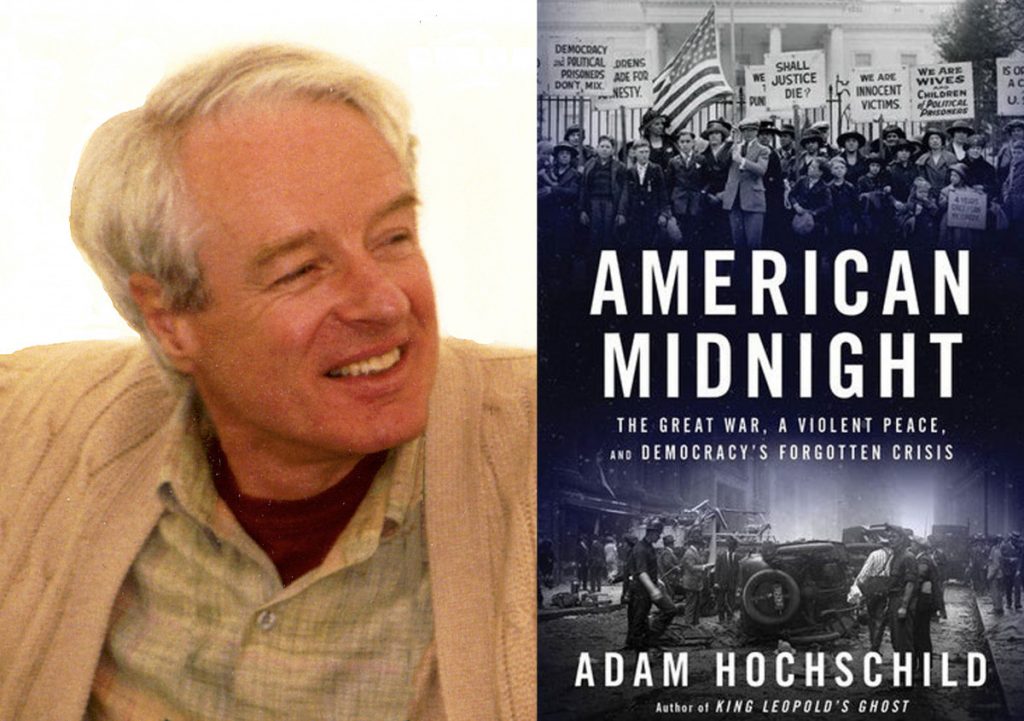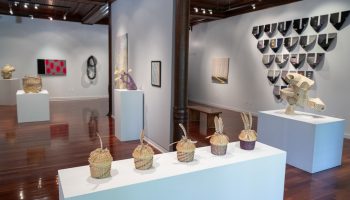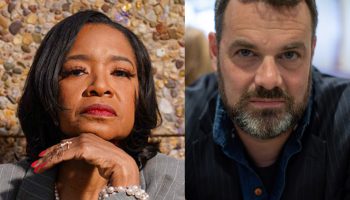
Kaitlyn Finchler
Staff writer
America is in a constant state of repeating itself — but only commemorating its victories, said historian Adam Hochschild. His book, American Midnight: The Great War, a Violent Peace and Democracy’s Forgotten Crisis, turns attention to what he considers an overlooked period — the tail end and aftermath of World War I — with eerie prescience for our times.
American Midnight is the Week Eight selection for the Chautauqua Literary and Scientific Circle, aligning with the theme “Freedom of Expression, Imagination and the Resilience of Democracy.” Hochschild, a journalist and author of previous CLSC selection King Leopold’s Ghost — a finalist for the National Book Critics Circle Award — will discuss his latest book at 3:30 p.m. today in the Hall of Philosophy.
In his talk, he said he wants to bring a “greater awareness” to the almost-totalitarian state the United States was in 100 years ago.
“We went through such a time ourselves, and we don’t pay enough attention to it,” Hochschild said. “I feel if I can make people more aware of it, it will make all of us more vigilant that we won’t let this kind of thing happen again.”
American Midnight serves as a reassessment of the period between WWI and the Roaring ’20s. Set in an era consumed by censorship, lynchings and sadistic, sometimes “fatal abuse” of imprisoned people, the book provides a timeline of these years, which isn’t too well-documented in history classes or literature.
American Midnight is Hochschild’s 11th book; the journalist and historian frequently writes about social justice and human rights issues, and is a lecturer in the Graduate School of Journalism at the University of California, Berkeley,
Sony Ton Aime, the Michael I. Rudell Director of Literary Arts, said that America’s story from 1917 to the early 1920s isn’t too dissimilar to America now.
“At times, you’re thinking that maybe democracy won’t survive,” he said. “With World War I happening (then) and the war in Ukraine right now, there were a lot of connections and things that mirror our present times. However, as a country, the United States got through it.”
In the prologue, Hochschild said his hope is “that by examining closely an overlooked period of time, we can understand them more deeply and better defend against them in the future.”
Some examples of this are the world wars, won by the United States and its allies, and the Civil War, which was won by the side who wanted to keep the country together — although Hochschild said the South “glorifies the Civil War” in its own way.
“I think we skipped over times when things were not so good,” Hochschild said. “As I learned more and more about this period … I realized how much of it was left out of my high school history book.”
This period of time, he said, had the “worst political repression” in the United States since the immediate aftermath of slavery.
“Roughly 1,000 Americans (went) to jail for a year or more,” Hochschild said. “Also, a much larger number (of people were jailed) for shorter periods, solely for things that they wrote or said. These are important things and we shouldn’t skip over them.”
Woodrow Wilson, the 28th U.S. President, is the main focus of the story, as it starts April 1917 when Wilson went before Congress to ask them to declare war, and ends when he stepped down from presidency.
Ton-Aime said American Midnight not only offers solutions, but provides examples of the people who made the solutions happen.
When developing the characters, Hochschild said he found it fairly easy, as the president’s life and the lives of those around him were heavily documented. He then searched for other people of the time who would “dramatize” the events of the period.
“Eugene Debs was an obvious choice because he was an outspoken opponent of the war,” he said. “For that, (he) was sentenced to 10 years in prison by a judge who was a former law partner of Wilson’s secretary of war.”
Also among the characters are activists Emma Goldman and Kate Richards O’Hare — who ended up as cell-neighbors in a Missouri penitentiary.
“They served their sentences, became great friends and wrote their recollections of the other,” Hochschild said. “That’s a writer’s dream, when two of the characters you’re following actually give you their thoughts about the other one.”
Goldman was imprisoned for a speech denouncing WWI, while O’Hare was jailed for obstructing the draft. According to the Zinn Education Project, Socialist Party leader Debs said the United States, under plucratic rule, is the only country that would send a woman to prison for five years for exercising the right of free speech.
One of the main elements in American Midnight, other than history repeating itself, is the centering of people who were persecuted for expressing their freedom of speech.
“The main thing you can do to protect freedom of speech is to use it,” Hochschild said. “Use it to the maximum extent. Don’t hold back if something alarms you that you see, speak out about it.”
Hochschild said freedom of speech is “much better established” than it was 100 years ago.
“Part of the effect of this period of repression we went through then, was to lead to some reforms and court decisions and so on,” he said, “which has made the First Amendment a little more protected than it used to be.”
Without the same benefit of hindsight in observing and writing about America 100 years ago, Hochschild considered what historians 100 years from now will observe and write about this moment. He thinks people will analyze the Jan. 6, 2021, attack on the Capitol and think the United States “came pretty close” to losing its democracy.
“I hope that the historian 100 years from now, looking back, will see a United States that, in 2024, resoundingly defeated Donald Trump’s attempt to be re-elected,” he said. “That will telegraph something about the kind of society we are, but we’re going to have to wait to see whether that’s true.”




